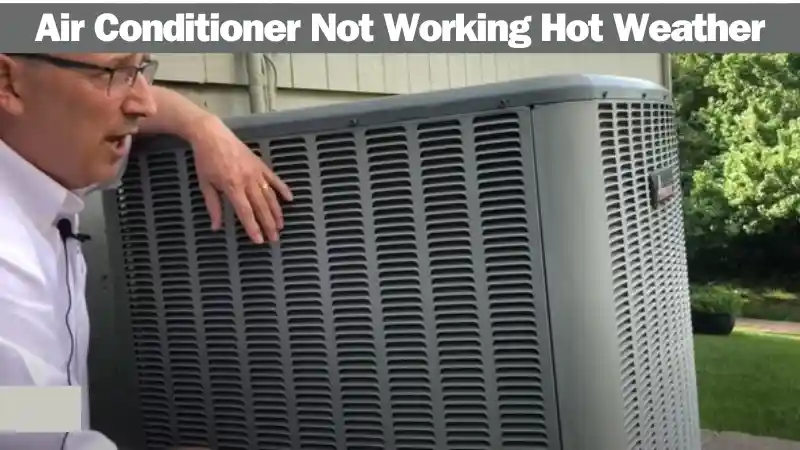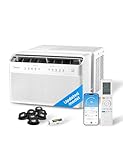When the temperature rises, your air conditioner may struggle to keep up due to low coolant and restricted airflow. This can lead to issues such as clogged filters, low refrigerant, and insufficient airflow, causing the system to stop working.
In hot weather, it’s crucial to ensure that your AC has adequate coolant and unobstructed airflow to operate efficiently. As the temperature soars during hot weather, it’s common for air conditioners to struggle to maintain a comfortable indoor climate.
If your AC is not blowing cold air or is unable to keep up with the heat, it may be due to issues such as clogged filters, low refrigerant levels, or restricted airflow.
We will explore common reasons why ACs may stop working in hot weather and provide troubleshooting tips to help you address these issues.
It’s important to ensure that your AC system is properly maintained and equipped to handle the demands of extreme heat to keep your indoor environment comfortable.
You May Like
- EFFICIENT COOLING: 5000 BTU cooling capacity ideal for rooms up to 150 sq….
- SMART MAINTENANCE: Equipped with an easy-access, washable filter that…
- CUSTOMIZABLE COMFORT: Features 7 precise temperature settings, 2-speed…
- QUIET OPERATION: Low noise level up to 56 dB creates a peaceful environment…
- EFFICIENT COOLING: 6000 BTU cooling capacity ideal for rooms up to 250 sq….
- SMART MAINTENANCE: Equipped with an easy-access, washable filter that…
- CUSTOMIZABLE COMFORT: Features 7 precise temperature settings, 2-speed…
- QUIET OPERATION: Low noise level up to 56 dB creates a peaceful environment…
- [Quiet Operation & Energy Efficiency]:ZAFRO window air conditioner operates…
- [Powerful cooling capacity]:ZAFRO air conditioner window unit uses advanced…
- [Applicable Size]:Air conditioner has dimensions of only [28.94 x 18.7 x…
- [Easy Installation & Maintenance]:Air conditioner window unit is very…
- Effortless Cooling: Achieve optimal comfort with customizable temperature…
- Easy Maintenance: Keep your air conditioner running efficiently with the…
- Undisturbed Comfort: Experience a peaceful home environment with a quiet…
- Effortless Convenience: Benefit from the Auto Restart feature, which…
- ULTRA QUIET – The U-shape design of Midea U Smart Inverter AC uses your…
- MORE THAN 35% ENERGY SAVINGS – With the advanced DC Inverter technology,…
- SMART CONTROL – Midea U Smart Inverter AC is Wi-Fi enabled and can be…
- FLEXIBLE WINDOW OPENING – The U-shaped design allows your window to open,…
Initial Ac Troubleshooting Steps

If your air conditioner stops working in hot weather, you should check for low coolant levels and restricted airflow. Low refrigerant and clogged filters are common culprits for AC malfunction during hot days. Ensure the system has proper coolant levels and unrestricted airflow for efficient operation.
Preliminary Safety Checks Before Troubleshooting
Before starting with the troubleshooting process, ensure to follow these preliminary safety checks:
- Turn off the power supply to the air conditioning unit to prevent any electrical mishaps.
- Use safety gloves and goggles to avoid any injuries while handling the AC components.
- Inspect for any signs of leakage, corrosion, or damage in the AC unit’s exterior before proceeding.
Quick User-friendly Checks
Quick user-friendly checks that can help identify common AC issues include:
- Checking and replacing clogged air filters to ensure proper airflow through the system.
- Ensuring all vents and ducts are open and unobstructed to allow a seamless air circulation process.
- Verifying the thermostat settings to ensure it’s correctly programmed for the desired cooling temperature.
Tools And Materials Needed For Diy Inspection
If you’re considering a DIY inspection, here are the basic tools and materials you might need:
- All-purpose screwdriver set for opening the AC unit panels for visual inspections.
- Flashlight to aid in locating any leaks or damages within the system.
- Thermometer to check and compare room temperature and air output to identify cooling discrepancies.
- Protective gloves, safety glasses, and a mask to ensure personal safety when handling AC components.
Recognizing Common Ac Issues
When facing hot weather, an air conditioner not working can be quite a concerning issue. It is crucial to recognize the common problems that could lead to this malfunction, particularly focusing on low coolant and airflow restrictions.
By identifying the symptoms and consequences of these issues, you can effectively troubleshoot and address the problem to restore your AC’s functionality.
Identifying Low Coolant Symptoms
Low coolant in the AC system can lead to inadequate cooling and potential system failure. It is essential to recognize the symptoms of low refrigerant to address the issue promptly:
- Insufficient cooling performance
- Ice buildup on the evaporator coil
- Audible hissing or bubbling noises from the refrigerant lines
Signs Of Restricted Airflow Consequences
Restricted airflow can severely impact the efficiency of the AC system, leading to poor cooling and potential damage. It is crucial to identify the consequences of restricted airflow:
- Reduced cooling capacity
- Increased energy consumption
- Potential compressor overheating
Detailed Guide To Diy Ac Fixes

Credit: www.searshomeservices.com
Is your air conditioner giving up in the scorching hot weather? Check for low coolant levels or airflow obstructions. Clogged filters and low refrigerant are common culprits. Unclog vents and filters or get a professional to refill the refrigerant to keep cool during hot days.
Step-by-step Coolant Level Assessment
One of the most common issues that can cause your air conditioner to malfunction during hot weather is a low coolant level. It’s crucial to ensure that your AC system has enough coolant to operate efficiently. Here’s a step-by-step guide to assessing the coolant level in your air conditioner:
- Start by turning off the power to the AC unit to ensure safety.
- Locate the access panel on the outdoor condenser unit.
- Use a wrench to remove the access panel and locate the coolant lines.
- Check the coolant level on the sight glass or using a refrigerant gauge.
- If the coolant level is low, you may need to add more coolant, but it’s recommended to consult a professional HVAC technician to perform this task.
Clearing And Preventing Airflow Obstructions
Another common reason for an AC not working in hot weather is the obstruction of airflow, which can lead to inefficient cooling. Ensuring unrestricted airflow is crucial for the optimal performance of your air conditioner. Here’s how you can clear and prevent airflow obstructions:
- Regularly clean or replace the air filters to prevent clogging and blockage of airflow.
- Inspect the outdoor unit for any debris or vegetation that may be obstructing the airflow, and clear it if necessary.
- Keep indoor vents and registers unobstructed to allow for proper airflow throughout the space.
- Consider scheduling routine maintenance and cleaning of the AC system to prevent the accumulation of dust and debris that can hinder airflow.
Dealing With Ac Electrical Anomalies
When your air conditioner fails to function during hot weather, it can be frustrating and uncomfortable. One of the common reasons for AC malfunction is electrical issues.
Addressing these anomalies is vital to ensure your AC system operates optimally. Here are some tips for dealing with AC electrical anomalies to troubleshoot and rectify the issues effectively.
Troubleshooting Electrical Disconnects
Electrical disconnects are essential components in your AC system. Ensuring they are functioning properly is crucial for the system’s operation. Here are some steps to troubleshoot electrical disconnects:
- Check for any signs of damage or wear on the disconnect switch.
- Inspect the electrical connections for loose or corroded wires.
- Ensure the circuit breaker for the AC unit is not tripped.
- Verify that the disconnect switch is in the “ON” position.
Recognizing A Faulty Thermostat
A faulty thermostat can lead to AC malfunctions. It is essential to identify and address thermostat issues promptly. Here’s how to recognize a faulty thermostat:
- Check if the temperature displayed on the thermostat matches the actual room temperature.
- Test the thermostat by setting it to a lower temperature and listen for the AC to kick in.
- Replace the thermostat batteries if it’s battery-operated.
- Consider recalibrating the thermostat to ensure accurate temperature readings.
When To Call The Professionals
Complex Issues Requiring An Hvac Expert
While some air conditioner issues can be resolved with basic troubleshooting, there are complex problems that require the expertise of an HVAC professional. These issues may include malfunctioning compressors, refrigerant leaks, electrical faults, and motor failures.
Attempting to address these complex issues without the necessary skills and knowledge could lead to further damage to the air conditioning system.
The Benefits Of Professional Maintenance Services
Regular professional maintenance services for your air conditioner offer several benefits. HVAC experts can identify and address potential issues before they escalate, ensuring that your system operates efficiently, especially during hot weather.
Professional maintenance also prolongs the lifespan of your air conditioner and maximizes its performance, ultimately saving you from costly repairs and replacements in the long run.
Air Conditioner Not Working: Expert Support
When hot weather hits, your air conditioner (AC) not working can be a major inconvenience. It’s crucial to promptly address any issues to ensure your comfort and well-being.
Understanding the difference between DIY fixes and expert solutions, along with knowing how to choose a reliable HVAC service provider, is essential to get your AC back up and running efficiently.
When your AC malfunctions in hot weather, DIY fixes may seem tempting, but they often provide only temporary relief. Expert solutions offer long-term benefits and address underlying problems, ensuring optimal performance of your AC.
Choosing a dependable HVAC service provider is crucial for effective AC repairs. Look for licensed professionals with proven experience and positive customer reviews. Ensure the provider is insured and offers warranties on their services. Transparent pricing and 24/7 emergency services are also important factors to consider.
Frequently Asked Questions For Air Conditioner Not Working Hot Weather
Why Does My Ac Stop Working In Hot Weather?
Your AC may stop working due to low coolant or restricted airflow, causing inefficiency. Keep filters clean and ensure proper refrigerant levels and airflow for optimal performance. Regular maintenance can help prevent issues.
Is It Normal For Ac To Struggle On Hot Days?
During hot days, AC may struggle due to low coolant or airflow restriction. Proper maintenance and efficient airflow are essential for optimum performance.
Keep filters clean and ensure adequate refrigerant levels to prevent issues during extreme heat. If AC performance remains poor, seek professional assistance for repair and maintenance.
Why Is My Ac Not Blowing Cold Air When Hot Outside?
If your AC isn’t blowing cold air when it’s hot outside, it may be due to low coolant or restricted airflow. Ensure the system has sufficient coolant and unobstructed airflow to work efficiently. Regular maintenance can help prevent these issues.
What To Do If Your Ac Stops Working In The Summer?
If your AC stops working in hot weather, check for low coolant and restricted airflow. Clean or replace clogged filters, and open closed vents. If the issue persists, seek professional HVAC maintenance. Properly sized and maintained units can struggle in extreme heat.
Conclusion
In hot weather, a malfunctioning air conditioner can be a major inconvenience. Low coolant and restricted airflow are common culprits. To prevent this issue, regular maintenance and replacing clogged filters are key.
When your AC struggles, it’s important to address the problem promptly to avoid discomfort during hot days.
Regular maintenance can help your AC run smoothly and efficiently, even in extreme heat.





